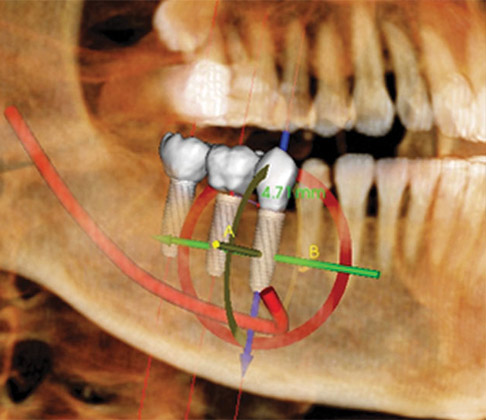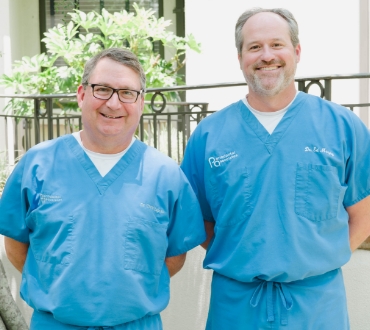Jump to a Section:
When our baby teeth fall out, and adult teeth take their place, we often refer to them as “permanent.” Unfortunately, for some of our patients, the permanent teeth are anything but. Millions of Americans cope with tooth loss, whether due to traumatic accidents, untreated periodontal disease, or simple dental neglect.

When you lose your adult teeth, it is crucial to replace them as expediently as possible. Not only does this help you maintain the esthetics and functionality of your smile, but it also prevents further degradation of bone and jaw tissue.
One of the most comfortable and lasting options for tooth replacement is dental implants. Periodontal Associates boasts ample experience providing dental implants for patients throughout Charleston, SC. To find out more about your options for dental implants, we welcome you to schedule an appointment with us.
What Are Dental Implants?
If you have never seen a dental implant before, imagine a small metal screw. This screw is placed into the jaw bone, where it fuses with the surrounding tissue so that it is held securely in place. Once this happens, the implant serves as an artificial tooth root, replacing the root of your missing tooth.
A small component called an abutment attaches to the top of the dental implant. An artificial tooth then attaches to the abutment. This artificial tooth may be a crown, a bridge, or even a partial denture, depending on your specific needs. These artificial teeth are always custom-made to look and feel exactly like your normal, growing teeth.
What Dental Implants Can Do:
- Replace one or more teeth without affecting bordering teeth
- Support a bridge and eliminate the need for a removable partial denture
- Provide support for a denture, making it more secure and comfortable

Why Do I Need Dental Implants?
Generally speaking, we recommend dental implants for most patients who have either lost teeth or who anticipate the need to have teeth extracted.
Dental implants are beneficial for a couple of reasons. The first reason is the obvious one: nobody wants to go through life with missing teeth. Dental implants will allow you to restore your smile, both esthetically as well as functionally. In other words, you can ensure there are no gaps in your smile, and you can also regain your ability to eat all of your favorite foods.
Additionally, dental implants can help prevent the loss of jaw bone and other tissues. It is important to understand that your jaw bone requires regular stimulation… stimulation that it receives from the root of your tooth. When you lose that tooth, you also lose the stimulation, which can actually cause your jaw bone to deteriorate and shrink over time.
Not only can this lead to a sunken facial appearance, but in some cases, patients are left with so little jaw bone that they cannot get dental implants without a bone graft. Because of this, we typically recommend pursuing dental implants as soon as possible following tooth loss.
What are the Most Common Causes of Tooth Loss?
Tooth loss is more common than you might think. At Periodontal Associates, we treat patients who have either lost their teeth or need to have a tooth extracted for any number of reasons. Some of the most common causes of tooth loss include:
Periodontal Disease
Periodontal disease, or disease of the gums, is the most common cause of adult tooth loss. When left untreated, periodontal disease can cause gum tissue to deteriorate so much that the teeth are no longer held properly in place.
Traumatic Accident
Often, tooth loss happens due to a simple accident, whether that is a car collision or a sports accident. If a tooth is badly broken, it may not be salvageable. Instead, your dentist may recommend removing and replacing it.
Tooth Decay
Some patients either lose teeth or need to have teeth pulled because they have become so badly decayed. This is often linked with dental neglect, though other diseases and risk factors can play a part.
Restore Your Smile with Dental Implants.
Tooth loss can happen for any number of reasons, including periodontal disease, traumatic accident, or simple dental neglect. It is crucial to replace lost teeth soon before you experience further deterioration of the bone. Dental implants offer a safe, comfortable, and long-lasting solution. Find out more about your dental implant options.

Who Are the Best Candidates for Dental Implants?
The best way to determine whether you are qualified for dental implants is to join us at Periodontal Associates in Charleston, SC. Following a one-on-one consultation and dental evaluation, your periodontist will talk with you about some of the best options for replacing teeth.
The best candidates for dental implants generally meet the following criteria:
- They have either lost teeth or anticipate the need to have teeth extracted
- They have sufficient bone left in their jaw
- They are in overall good health
- They do not have any untreated periodontal disease
- They have spoken with a periodontist and have the right expectations about dental implants
We do not recommend dental implants for those who are simply dissatisfied with the cosmetic appearance of their teeth. There are better, easier ways to improve the appearance of your smile without pulling all your teeth and starting over with implants.
To learn more about eligibility for dental implants, schedule an appointment with Periodontal Associates.

Treatment Options
This procedure is a team effort between you, your dentist and your periodontist. Your periodontist and dentist will consult with you to determine where and how your implant should be placed. Depending on your specific condition and the type of implant chosen, your periodontist will create a treatment plan tailored to meet your needs. Click for more information about the treatment options described below.
Replacing a Single Tooth
If you are missing a single tooth, one implant and a crown can replace it. A dental implant replaces both the lost natural tooth and its root.
Replacing Several Teeth
If you are missing several teeth, implant-supported bridges can replace them. Dental implants will replace both your lost natural teeth and some of the roots.
Replacing All of Your Teeth
If you are missing all of your teeth, an implant-supported full bridge or full denture can replace them. Dental implants will replace both your lost natural teeth and some of the roots.
Sinus Augmentation
A key to implant success is the quantity and quality of the bone where the implant is to be placed. The upper back jaw has traditionally been one of the most difficult areas to successfully place dental implants due to insufficient bone quantity and quality and the close proximity to the sinus. Sinus augmentation can help correct this problem by raising the sinus floor and developing bone for the placement of dental implants.
Ridge Modification
Deformities in the upper or lower jaw can leave you with inadequate bone in which to place dental implants. To correct the problem, the gum is lifted away from the ridge to expose the bony defect. The defect is then filled with bone or bone substitute to build up the ridge. Ridge modification has been shown to greatly improve appearance and increase your chances for successful implants that can last for years to come.
Meet Your Periodontists
As you consider your options for dental implants, we welcome you to learn more about Periodontal Associates. Our practice has ample experience treating patients in the Charleston, SC area. We are known not only for our experience and our clinical precision but also for our warm and welcoming practice environment. Our providers take plenty of time getting to know each patient, answering any questions, and fully explaining the treatment options. Get to know our providers by checking out their bios.
How Much Do Dental Implants Cost?
The cost of dental implants varies depending on the complexity of your treatment and individual needs. While prices can range from $3,000 to $5,000 per implant on average, your final cost may differ based on your specific case and additional procedures that may be necessary. Your insurance coverage for the procedure is determined by your provider and your specific plan. We recommend reviewing your policy or contacting your insurance company to understand your coverage for dental implants.
Can My Insurance Cover the Cost of Dental Implants?
Our team is happy to assist you in exploring payment options for any treatment costs. Please contact our office before your appointment for any financial inquiries or assistance. For more details on insurance and financing, visit this page.
Getting Dental Implants: About the Process
For those who are considering dental implant surgery, the process can naturally feel overwhelming. When you join us for your initial appointment, your periodontist will be glad to break down the process into individual steps.
Typically, the dental implants process looks something like this:
Consultation
We always like to begin by getting to know you a bit better. During a one-on-one appointment, your periodontist will perform an evaluation of your teeth and gums, take some images, and ask some questions about your medical history. This is also an opportunity for you to ask any questions you may have about the dental implant process. At the end of this appointment, you and your provider can agree on a treatment plan.
Preparation
For some patients, there may be some preliminary steps that must be taken in order to prepare for dental implants. For example, any damaged or decaying teeth will need to be removed. Underlying gum disease will require treatment. And, your surgeon will take measurements of your teeth to ensure that your new replacement teeth look and fit just right.
Placing the Implants
The placement of dental implants is always performed while you are carefully sedated, creating a painless and comfortable process. Using the most up to date technology, the implant placement is pre-planned and placed according to the expertise of your periodontist. Your periodontist can provide a temporary replacement tooth in the meantime; though it will be very limited in its functionality, this temporary replacement will keep you from having a gap in your smile.
Placing the Prosthesis
It may take up to three months for the implants to heal, fusing securely with the surrounding bone and tissue. Once this happens, you will be invited to return for the abutment and your dental prosthesis to be placed. Again, this may be a crown, bridge, or even a partial denture, customized to look and feel just like your naturally-growing teeth.
Will Dental Insurance Cover Implants?
One of the most common questions we hear about dental implants is whether or not insurance will cover them. All dental insurance plans are unique, so we would always encourage patients to check their specific coverage.
Our office is happy to answer any further questions you have about insurance coverage and to help you get the maximum reimbursement for your procedure. Reach out to Periodontal Associates to find out more.
Does Getting Dental Implants Hurt?
Another common question we receive about the dental implant procedure is whether it will cause pain. It is a major priority for us to keep our patients comfortable throughout their procedure, something we achieve by offering sedation options.
Sedation Options
Depending on the nature of the procedure, our practice can offer IV sedation, nitrous gas, or localized anesthesia. Generally, for dental implants, we will recommend IV sedation, which can both minimize pain and also prevent any unwanted memories of the procedure. Ask your periodontist for more information about the different sedation options.
Following the Dental Implants Procedure
After the sedation wears off, you can anticipate some soreness or discomfort. This can be managed with the right medications. Your periodontist can advise you on the types of pain relief that come most highly recommended.
Recovery from Dental Implants
Following any surgical procedure, you will need to allow your body some time to rest and recover. Before your dental implant surgery, your periodontist will provide you with specific advice for navigating the recovery process.
What to Expect Following Dental Implant Surgery
The first few days following dental implant surgery may bring minor swelling and discomfort.
If you have extreme, unexpected, or long-lasting symptoms, do not hesitate to contact your surgeon directly.
How Much Time Should I Take Off for Dental Implant Surgery?
Before scheduling a dental implant procedure, it is recommended to discuss this with your periodontist. It is crucial that you allow your body and your mouth the necessary amount of time to rest and to heal.
So how much time should you take off? Most patients will feel like taking it easy for one to two days. Our recommendation is to schedule your dental implant surgery at a time convenient to your schedule.
When Can I Eat Like Normal Following Dental Implant Surgery?
Once your dental implant surgery is complete, you will have some bandaging at the incision site, preventing bleeding. Keep this bandaging in place for an hour or so. After that, you may remove the bandages to grab something to eat.
For the first 24 hours, we recommend sticking with a semi-soft diet and avoiding hard granular foods (i.e. nuts, seeds and popcorn). Think applesauce, room-temperature soups and broths, mashed bananas, yogurt, smoothies, or ice cream. Avoid anything hot or spicy, which can result in inflammation. Also, avoid drinking from a straw during those first 24 hours.
Over the course of the first few days, you can begin transitioning back into a more typical diet. However, you will still want to avoid excessively hard, crunchy, or sticky foods, particularly around the site of your dental implants.
Do I Really Need Dental Implants?
Most of us never plan on losing our adult teeth, and yet, tooth loss can happen for any number of reasons. If you lose teeth or need to have teeth extracted, it is crucial to replace them as promptly as you can, preventing the degradation of your jaw bone.
Dental implants represent a more comfortable, secure, and long-lasting alternative to traditional dentures. We welcome you to learn more about the perks of dental implants and about your own eligibility for them.
Hear From Our Patients
Get Dental Implants in Charleston, SC
Ready to speak with a periodontist who specializes in dental implants? We invite you to contact our practice, where you can learn everything you need to know about getting dental implants. To schedule an appointment with Periodontal Associates, reach out to our Charleston, SC practice whenever you are ready.









